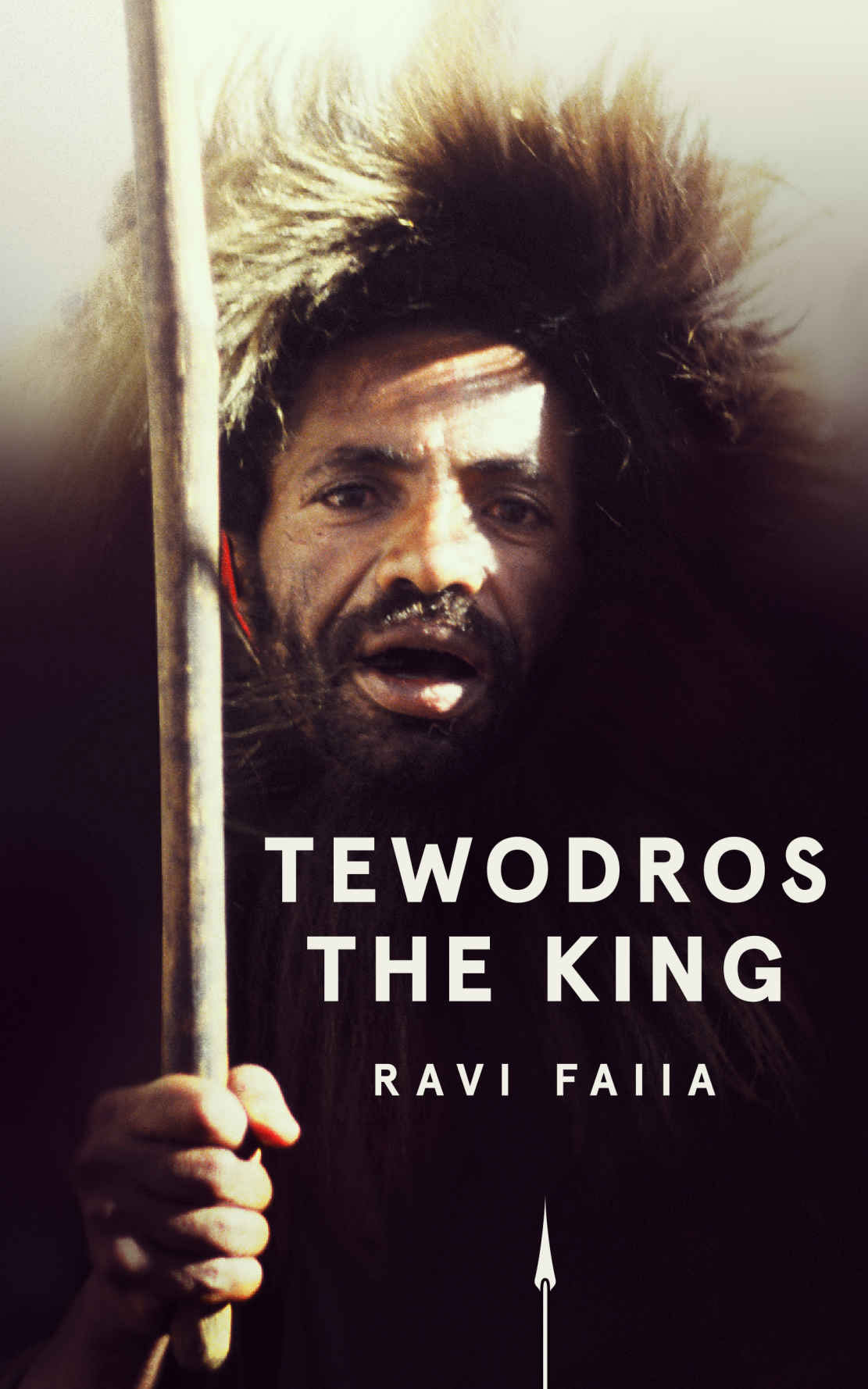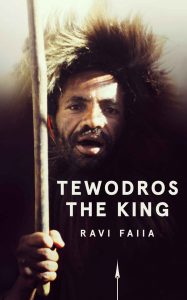It is with pleasure that we welcome Ravi Faiia, author of Tewodros The King, as our featured author for June.
Ravi spent many years writing his debut novel, drawing on his memories of what made places special, like southwest England, the Indian subcontinent, and most of all East Africa. While communist Ethiopia faced famine and civil war in the 1980s when he lived in Addis Ababa, in mediating his impressions through the wonder and optimism of a sheltered early childhood, he was lucky enough to imbibe instead the elegance and purity of the Ethiopian spirit, and now harks back only to halcyon days spent in a sun-splashed and magical country. This is the Ethiopia he hopes to evoke in his book – seeing through inescapable tragedy to find the romance of the human experience in a land like no other.
In this excerpt from Tewodros The King, “Dedjazmatch” and “Grazmatch” are Ethiopian titles denoting military commanders, and “Ras” means “Prince.”
Tewodros The King
PART THREE – BARON OF MAGDALA
Chapter Seven
Makonnen rode in the first rank of the cavalcade; he knew each footfall of his mount was marking history; the ride of Ras Makonnen. They could reach Balcha’s camp as night fell if they kept a good pace; the timing was perfect and the horses were well rested for the challenge. The first drops of rain struck his face, one, two, three at first, and then too many to count as the water became a wall through which the riders must constantly breach, and the trees to the fore melted into a dull pastiche of their former green.
“Spears only!” the word was passed back through the column, “we cannot trust the guns when they are wet.” The increasing resistance of the wind-borne drops and steepening trail only served to goad the riders into pushing onward, upward, and faster.
“We are an unstoppable force,” Makonnen shouted to the weather, and to no one, and to everyone. “We will cut through Balcha’s camp before they know what came out from the mists. We will ride him down before they can raise a rifle or spear to stop us. Long live the King!” and he heard it echo next to him, then behind him, and all the riders took up the chant, “long live the King.”
* * * * *
It was evening and Alemu was tired of waiting, tired of the incessant raindrops that slopped against his tent, and he didn’t care if he got wet or Balcha’s men shot him. Maybe there was news to be had of new orders, and the rain was refreshing as it doused his upturned face the moment he left the tent. Nobody was stirring in the camp, and the sentries around it were shrouded from his view.
Now he heard a yelp from down the valley, and a muffled thunderclap; yet the thunder rolled on for too long, and there had been no lightning. He straightened and peered into the gloom. Something was moving, and some voice in his head told him to crouch down near the earth that was turning to muck and mire.
Like a line of ghosts he saw them pass, the riders of Makonnen’s army, a spray of mist flying up around them as they fanned out to ride through and over the tents of Balcha’s camp. Here and there a shot, a scream, but with the storm and the suddenness it was chaos and Alemu saw many men around him scramble from their tents only to stand dumbfounded, or crawl back to sit with their hands on their heads, not knowing what to do.
“In the center – the Dedjazmatch!” he heard a faint call, and saw others rally to its source, and he knew that Balcha would die.
Four hundred feet away, the guards around the Dedjazmatch’s tent yielded their arms and Makonnen dismounted with twenty others. “Come forth, Ras Balcha! You are surrounded, it is finished!”
The flap opened and there was the Dedjazmatch, hands at his side and his face impassive.
Makonnen did not hesitate. He thrust his spear into the center of Balcha’s chest, and the man staggered back into his tent and fell to the ground. Great shouts went up from Makonnen’s riders, “Balcha is dead! Return to the King! Death to traitors! Return to Tewodros!” as they circled the camp and found that none resisted.
Makonnen’s men entered the tent to secure it, and their leader followed. The Grazmatch placed a foot on the traitor’s chest and yanked the spear free in a fount of blood, but saw Balcha’s eyes flutter open. He knelt by the body and inclined his head – the traitor was trying to speak.
“Makonnen…” he rasped, and a hand rose to grasp the Grazmatch’s shoulder in a clawlike grip. “Tell the king…” and Balcha coughed horribly.
“You are not worthy that the king should listen.”
“I am guilty!” Balcha continued. “I must confess my deeds. Tell the king it was I…at Sodere, it was I…” and his hand slipped from Makonnen’s shoulder.
“What did you do, traitor?” asked Makonnen.
Balcha focused his eyes once more and held Makonnen’s gaze. “I am the one who killed Kassa. Tell Tewodros…let him feel no guilt at taking my life, or the lives of any Ethiopian I turned against him. Mine is the evil, I am the one. Is there no priest?” his eyes rolled around, and darkened.
“There is no time,” Makonnen replied, and to himself he continued, “Such is the grace that Tewodros has, I feel he may even have forgiven you all this before he put you to death; you his betrayer, you his father’s murderer. I am glad you did not have the chance to face him and receive his forgiveness, for you are not deserving of the heart of our king.”
He did not know if Balcha had heard, and Makonnen closed the dead man’s eyes. “It will only sadden Tewodros further to hear of this, but I will not deserve his trust either if I do not tell him.”
The Grazmatch straightened, and turned to Balcha’s honor guard. “You will bear the body back to Magdala, if you dare – or bury him in the trees as you see fit. But before you go, tell me what you know of the dealings with the British. What was promised, by you and by them?”
Balcha’s captain looked at his fellows, and when they nodded, he spoke. “The Dedjazmatch offered his services to the British if he would be made king upon their victory. The British requested a written agreement, that he would follow their instructions if they placed him on the throne.”
Makonnen interjected, “Ha! We prepare an ambush for this British so that when he comes to seal his pact with the traitor, he will meet instead with the ire of my forces – on top of Balcha’s, whom he thought had surrendered to him!”
Makonnen sneered in triumph, but the captain went on. “The British arranged that the Dedjazmatch was to meet in their camp to sign the agreement, and required that when the British ascend the pass, they would see us camped below as a token of good faith.”
“Blast!” said Makonnen. “This British is devious. If we establish the high ground again we will lose any surprise, and who knows if we have time to prepare the defenses before he arrives at the pass.” He clutched his chin, and turned to peer through the tent flap at the still-drumming rain. “Blast. We can do nothing in this dark and rain. I will inspect the camp while we wait.”
As the general moved to go out he spoke for all to hear. “Sleep is for the weak. At first light I want scouts atop the pass to see if the British are coming.”








Tewodros the King did not dress like that. The attire is for tribes around northern Shewa. Tewodros wasn’t. Cover is wrong and completely misleading. Does not represent kingship. What are u trying to do?! U actually used a photo of an ordinary man.
Hi EB – this was indeed a photograph of an ordinary man that my mother took in Ethiopia in the 80s. It is not intended to represent Tewodros – thank you for clearing up any confusion! There are certainly historical drawings of the real emperor Tewodros II that people can see, even by looking at his wikipedia page. Hopefully reading the novel, which includes characters from different regions of Ethiopia who are both ordinary men and high-ranking generals, will elucidate what the cover image is trying to evoke.
I want to express my appreciation in connection with promoting our king story throughout the world
I hope this can inspire people to learn even more about the amazing history of Ethiopian civilization!
So, if Graham Hancock says its good, who am I to say otherwise 😉 ? Cant wait to put my hands on it.
Hope you enjoy – there is even a character named Henok in the book!
Read Murchison’s description of early exploration of Ethiopia in his Presidential address to The Royal Geographical Society journal vol. 14, 1844
pp xlv – cxxviii in jstor.
Beta Zion is the only Zion!Home of the unbroken Davidic succession of the Solomonic Dynasty which came to completion with it’s 225th Emperor H.I.M. Haile Selassie I, The Lion of Judah, Champion and Defender of the Tewahedo Church of Ethiopian Orthodox Christianity.